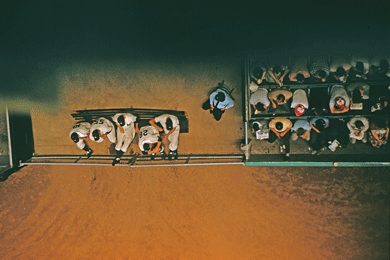Bernard Malamud was born in New York City in 1914 to a family that exchanged Yiddish for English, and he always regretted the loss. Older than Bellow and, in Roth terms, closer in temperament to Henry than Philip, he spent his life straining to regain both the ancestral language and an absent God with all the discipline of an outer-borough grocer. Malamud’s father was just that: Max, formerly Mendel, who quit a shtetl in the Russian Pale for Flatbush, Brooklyn, and a claustral apartment above a struggling store whose accounts he kept in pencil on spare bags. Malamud, never letting anything go to waste, assumed his father’s habit, and drafted all his dozen books in pen on unlined paper. He also apportioned that scribbling, along with his predilection for wounding revision, to Morris Bober, the hero of his novel The Assistant, who quit a shtetl in the Russian Pale for Flatbush, Brooklyn, and a claustral apartment above a struggling store.
A young girl enters with an order from her mother: a pound of butter, a loaf of rye, and a small bottle of cider vinegar.
[Morris] knew the mother. “No more trust.”
The girl burst into tears.
Morris gave her a quarter-pound of butter, the bread and vinegar. He found a penciled spot on the worn counter, near the cash register, and wrote a sum under “Drunk Woman.” The total now came to $2.03, which he never hoped to see. But Ida would nag if she noticed a new figure, so he reduced the amount to $1.61. His peace — the little he lived with — was worth forty-two cents.

“Third Avenue El,” by Barbara Morgan. Courtesy The Barbara Morgan Archive and Bruce Silverstein Gallery, New York City.
“Every man is a Jew, though he may not know it”: so goes Malamud’s most quoted and least appreciated pronouncement. He meant that every man, like Morris, suffers. With typically self-abnegating generosity — “though he may not know it” — Malamud entrusted the particularity of Jewish suffering if not to the universe then at least to Depression-era America. To be a Jew in exile had always meant to be divided between religious tradition and secular identity. Now, to be an immigrant was to be the victim of the same conflicting loyalties. The italyener, the irlender, to say nothing of the shvartser — whose passage wasn’t immigration but enslavement, to a Dixie Egypt — all came to America and so became “Jews.” America was a substitute Zion united only by its traumas.
The Assistant and The Natural — the latter concerns baseball, a.k.a. frustration — as well as twenty-five shorter works make up novels and stories of the 1940s and 50s, the first volume of Malamud’s enshrining in the Library of America. A New Life and The Fixer — both tales of confinement, one set at a West Coast college during the Eisenhower era, the other in a tsarist prison before a blood-libel trial — constitute the bulk of the second, novels and stories of the 1960s ($35 each loa.org). The entire edition has been edited and annotated by the Malamud biographer Philip Davis to herald the author’s centennial in April.

“Night Baseball Game, Yankee Stadium, Bronx, New York,” by Marvin Newman. Courtesy the artist and Bruce Silverstein Gallery, New York City.
Malamud’s characters are matchmakers, census takers, bakers, egg candlers — laborers, like Manischevitz, a tailor. He was “certainly not a man of talent. Upon him suffering was largely wasted. It went nowhere, into nothing: into more suffering.” In “The Angel Levine,” Manischevitz’s wife, Fanny, is bedridden and dying, and yet when a heavenly messenger appears to offer help, Manischevitz won’t let him touch her: “ ‘So if God sends to me an angel, why a black?’ ” he asks, “ ‘Why not a white that there are so many of them?’ ” Levine, the black angel with the Jewish name, vanishes. Manischevitz and Levine are unlikely symbionts, segregated by skin and cosmos. The tailor needs the angel’s miracle; the angel needs the tailor to believe in him so that he can earn his wings. Fanny deteriorates; Manischevitz despairs. Malamud’s genius is that his tailor’s leap of faith is nothing but a trip up to Harlem to seek his seraph amid the hostile dance halls of West 116th Street.
This tale, from 1955, exemplifies the Malamudian divide. The style is mythically Old World, but the themes are rigorously, even sanctimoniously, New. That division is starkest in the later novels, forthcoming in a final installment — mark your calendars for Yom Kippur. The Tenants is about black-Jewish relations in a decaying Manhattan, Dubin’s Lives about adultery in a decaying marriage, and God’s Grace about nuclear war and its sole human survivor, Calvin Cohn, a paleologist. To pass the time, or the end-time, Cohn reads the Bible to a group of surviving chimpanzees, until he gets his throat slit by Buz — a chimp redder and hairier than any pagan — in a ritual sacrifice while George, a gorilla, chants a rote and senseless prayer, wearing a muddy yarmulke recovered from the forest.
“The journey never ends” — this is how Gary Shteyngart dedicates his memoir, Little Failure (Random House, $27). Malamud’s father was a depressive, his mother a schizophrenic suicide; by that standard, Shteyngart’s carping, squawking parents are Semitic saints, deserving of filial affection. But then, they’re only the book’s co-dedicatees, sharing honors with “Richard C. Lacy, M.D., Ph.D.,” whose credentials are a deliberate betrayal. The Internet confirms: Dr. Lacy is a psychoanalyst with offices just off Central Park. Dr. Lacy must be a genius, the Gary Shteyngart of psych, to judge by the voluble equanimity of his patient. But then Shteyngart must be a genius, too, the Dr. Lacy of lit, because after this gesture there’s no way he’s going to have to pay for his sessions at the regular rate.
Shteyngart has taken stock of himself before: Vladimir Girshkin of The Russian Debutante’s Handbook, Misha Vainberg of Absurdistan, Leonard Abramov of Super Sad True Love Story. One is a sex-inept Russian émigré conning American students abroad in Eastern Europe; another is a sex-inept Russian émigré struggling with pot and obesity; yet another is a sex-inept son of Russian émigrés who salvages neglected novels and yearns for monogamy with a Korean woman. The current avatar, “Gary Shteyngart,” acknowledges the prior incarnations, if only to persuade the reader of his current credibility: He was born in Leningrad and lives in New York; he’s soberish, fit enough, moneyed, famous, and married to a Korean woman. Over the course of four books and twelve years, there’s been a bit of growth.
Shteyngart changed his first name from Igor to Gary in America, though that didn’t stop anyone from ragging on his denim, or calling him “Shitfart.” Any native can beat Zork, and beat off to Tahnee Welch in Cocoon, but it takes an immigrant to reconcile neoconservatism at Stuyvesant High School (resenting all the Muslim kids with 4.0 GPAs), with neoliberalism at Oberlin (resenting all the theater blondes who wouldn’t hook up), and to leverage an M.F.A. interview at Hunter into a publishing lunch, a contract, bestsellerdom. He’d been a cherished child in Leningrad, but in New York he became a parent to his parents, translating Doritos appetites to borscht mores and explaining the Clinton Administration.
The Shteyngarts, like most émigré Soviet Jews, cleaved to the G.O.P. and especially to Reagan, the Moses who freed them from the House of Bondage. The irony of this idolatry is that the family came to the States in 1979, back when Reagan was still just the ex-governor of Hollywood. In that year, a seven-year-old Shteyngart was one of 51,331 Soviet Jews granted exit visas for Israel, which wound up absorbing only 17,278 of them. The rest took trajectories similar to the Shteyngarts’: flying via East Berlin to Vienna, refusing the offers of naturalization from Jerusalem, and fleeing to Rome, where they applied for American asylum. In the 1970s, the word “refusenik” indicated a Jew who’d been refused an exit visa, as punishment for dissent or for being an expert in the sciences. By the 1980s, Soviet Jews in Israel were mockingly applying it to comrades who, given the chance, preferred living along the LIRR tracks in Little Neck, Queens, where Shteyngart was resettled, to the borders of the West Bank and Gaza.
Shteyngart glosses over this history in a manner mildly avoidant and mildly bored. His major political move, instead, is to recount and regret his stint volunteering for the first campaign of Bush I, severing ties only after the victory party when two teenage WASPs mistake him for a waiter: “I’ll have a rum and Coke, just a splash of ice and a lime.”
The first wave of Russian-Jewish migration, between 1880 and 1914, set the standards for immigrant memoirs. They had to be either radical (Emma Goldman) or sentimental (Mary Antin), and they had to protect an ideal, whether socialist or capitalist. Shteyngart’s memoir washes ashore as the best of the second wave by dint of being neither and of protecting nothing but himself. If this makes him a Failurchka — as he’s called by his mother, for never doing a J.D., and by his father, for finishing below the New Yorker editor and enemy of Zion David Remnick in an online ranking of New York writers — it’s only because America is a Little Failure, too.
Lara Vapnyar, born in Moscow in 1971, is a year older than Shteyngart, and came to the States later, in 1994. She began studying English just as Shteyngart began drafting his debut. Little Failure is a novelistic memoir, but Vapnyar’s The Scent of Pine (Simon & Schuster, $25) is a memoiristic novel: if the former risks artificiality with an overload of detail (photographic memories of vodka binges and bong hits, verbatim conversations with exes), the latter risks naturalism with every detail it lacks. The Soviet landscape is taken for granted, as if Vapnyar were writing for Russians. America is a freeway surrounded by franchises, a chilly patch of autumnal New England. The heroine — Lena, a Muscovite — immigrated to the States with her husband, Vadim, with whom she has two children. This is also Vapnyar’s CV: Lara does nothing to disassociate herself from Lena.
But then the events get unverifiable; brushstrokes and grace notes emerge. The scene is “The Aesthetics of Oppression,” an academic conference held at a drearily anonymous hotel in Saratoga Springs, New York. Lena, whose specialty is Soviet sex education, meets Ben, whose specialty is comics. Sex and humor are intellectually linked, and soon the intellectuals are as well. They sleep together during a pit stop in Massachusetts, then continue on to Ben’s cabin in Maine, getting nearer to simultaneous orgasm by getting farther from the range of mobile signals.
Instead of feeling nervous that she was cut off from civilization, out in the wilderness with a man she barely knew, Lena just smiled. She felt as if the loss of connection made it easier to breathe somehow.
Four books in — the previous featuring a boyfriend, Vadim, and a Lena substitute named Tanya — Vapnyar’s technique hasn’t changed: her fiction mimics life until it has hoarded enough energy to mimic itself. Ben’s unheated, toiletless cabin duplicates cabins at the Soviet youth camp that employed an adolescent Lena as a counselor; her affair with Ben duplicates dalliances she had with soldiers assigned to the camp. Indeed, their entire escapade — in a car speeding along I-95, lumping around strange beds — serves double duty, providing intervening stretches for reclining, mirror arrangement, and reassessment of the past.
Lena and Ben, in the Maine beyond facts, are immigrants to each other. They create new selves from truths or lies — it doesn’t matter which, because whoever they become can be destroyed only by going home again. The Scent of Pine is a fair novel, but a freaky bundle to reflect on. The Russian past has lost its myth because the American future has lost its, too. The present exists only in the escape, though there are no countries left to escape to. “A man has to construct, invent, his freedom,” Malamud once said. “Imagination helps.”






























































































